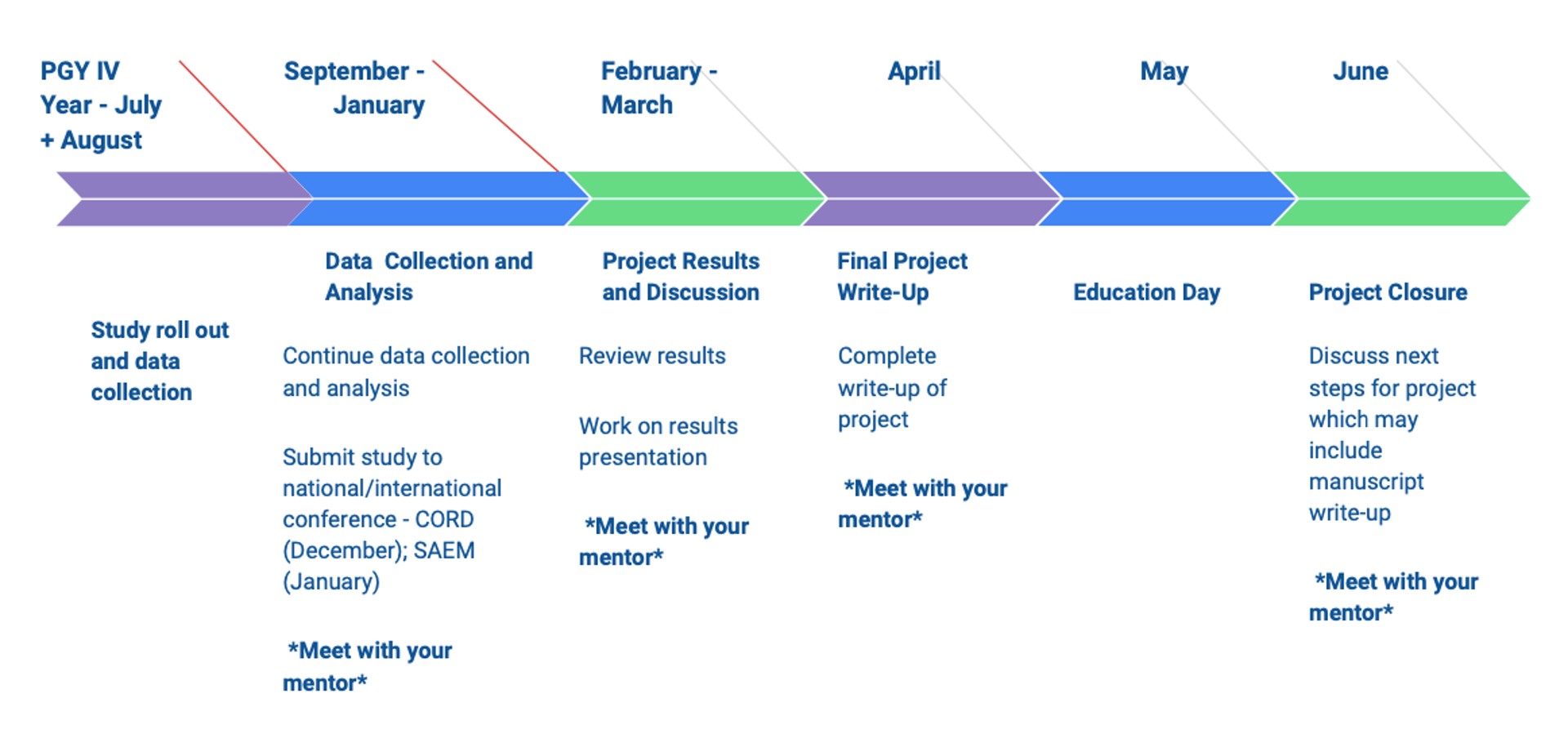Scholarly Projects & Research
About
Emergency medicine physicians in training must conduct scholarly work in their residency to meet requirements set forth by the ACGME and more importantly, develop the skills needed to practice the ever-evolving field of emergency medicine with incorporation of evidence-based and patient-centered medicine. There is no universal definition of what is expected of a resident’s work, though it should focus on an aspect of patient care that comes from curiosity, is grounded in evidence-based medicine, develops lifelong learning skills of an emergency medicine physician, and grows our field’s fund of knowledge.
NYP-CC Emergency Medicine residents are expected to produce quality scholarly work in which they have a primary role. This can include developing the original idea, the study design (if applicable), manuscript preparation, presentation at a national meeting, patient care initiatives, or formalized educational material. Data collection alone is not sufficient, nor is assisting editing of another’s publication. A scientific measurement and research component or education development are expected for most scholarly projects.
Resources
-
The Scholarly Project Handbook is a road map for how to navigate your required project by the end of the fourth year and rough timelines on when you can expect deliverables.
-
The "Golden Document" outlines all the major grants, conferences, and journals relevant to the EM space, and the most common areas where your potential works can be highlighted. It also includes timelines, application criteria, and respective scholarly focuses of organizations to help you find the right avenue to promote and disseminate your work.
-
The Institutional Review Board (IRB) is a group that reviews human subject research to ensure that it is being conducted ethically and to protect the rights and welfare of research participants. Any research that involves the study of human subjects requires IRB approval. IRB approval can be obtained through either institution.
-
All members of the Department (including students and trainees such as residents) who intend to participate in research in any capacity should obtain access to Weill Research Gateway (WRG), an online portal with relevant research administrative tools.
Department administrative leadership must separately request access for each person who needs it using this form.
Most department members participating in research will need access. Information is available here.
For students and trainees to gain access, they should be actively working on a project with a faculty member from the Cornell Emergency Department. The student/ trainee, along with their faculty project mentor, should contact Walid Farooqi (whf4001@med.cornell.edu) to request WRG access.
The request should include:
(1) the student/trainees full name and contact information
(2) a brief description of the research project
(3) the reason WRG access is requiredWalid Farooqi will review the project to confirm it's alignment with WRG access needs and communicate with Department administrative leadership to facilitate the access request.
Timeline
There are many opportunities both in NYP Emergency Medicine and our greater field to develop, pursue, and publish a scholarly niche. Many avenues to publications, presentations, and educational material exist locally, nationally, and internationally. The Resident Scholarly Committee was formed to help guide you from PGY-1 year through a full scholarly project to present in May of your 4th year. We aim to expand your scholarly work with ease by facilitating yearly milestones, arranging mentorship, and supporting project development.
During the first half of the PGY1 year, residents are encouraged to think critically about their patient encounters and experiences (developing clinical questions, when appropriate), their academic interests, and their personal interests. These experiences and interests should inform a resident’s Scholarly Project. By January of the PGY1 year, residents may have a sense of what particular clinical or extra-clinical “niche(s)” they find interesting. These may be clinically-related (e.g., therapeutic hypothermia post-cardiac arrest, MRSA infection in the ED) or extra-clinical (e.g., international emergency medicine, use of simulation in resident education), and they may be focused narrowly or broadly (e.g. “use of ultrasound in obtaining intravenous access”, versus simply “ultrasound”). PGY-2s will work towards creating a scholarly project outline by December and a project proposal following their SAEM trip in May, with the RSC’s guidance and help of a mentor.
Having a faculty mentor/collaborator is an important component of a successful Scholarly Project. Residents should choose a faculty member whom they work well with and share common academic interests, the RSC will help residents find proper mentorship in their field of study. Residents are not obligated to complete their project with their faculty mentor/collaborator, but rather this relationship is intended to foster academic discourse, and to identify one specific faculty member for each resident that may be turned to for advice and assistance in navigating the process of taking an idea and following it through to a completed project. Residents should meet with potential faculty mentors/collaborators as they develop their area of interest.
PGY-3 and PGY-4 years are focused on the development of a resident scholarly project, from proposal, to abstract, through the relevant data collection or curriculum development, and finally deliverable as published and presented findings by Resident Research Day prior to graduation.
Resident Scholarship Committee Faculty
Dr. Lynn Jiang
lgj7001@med.cornell.edu
Assistant Director of Research, Director of Research Education and Training Programs
Co-Director of Residency Scholarship Committee (Cornell)
Dr. Vinay Saggar
vs2362@cumc.columbia.edu
Columbia Emergency Department Wellness Co-Chair
Co-Director of Residency Scholarship Committee (Columbia)
Dr. Stephen Meigher
sm5483@cumc.columbia.edu
Co-Director of Residency Scholarship Committee (Columbia)






